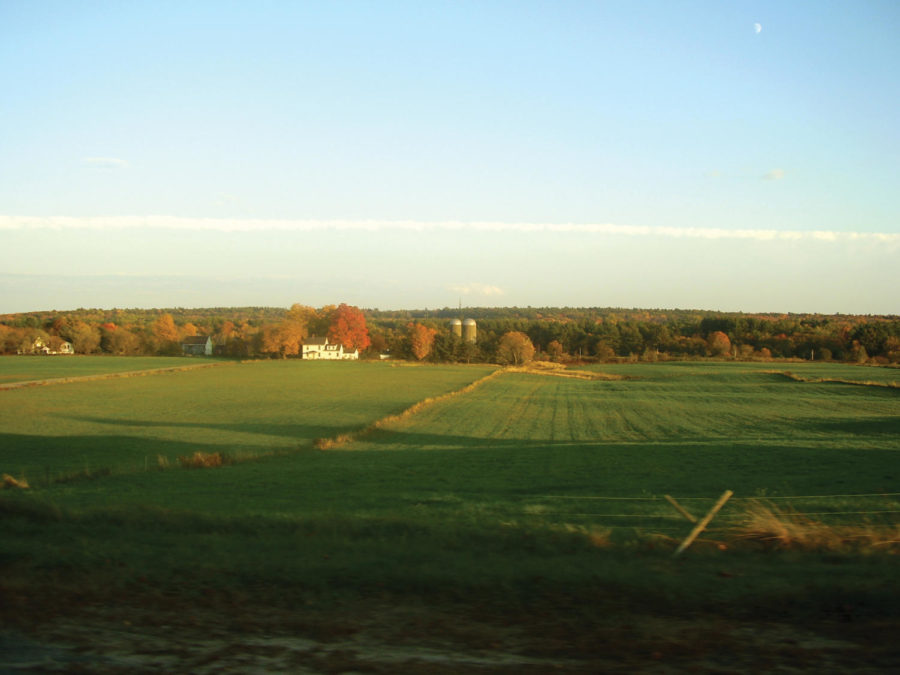Lauver: Who is going to feed your world?
Photo courtesy of Flickr/sheagunther
Opinion: Lauver 9/17
September 17, 2012
As the next generation of Americans, our generation must be prepared for the challenge of feeding a growing world population. Currently, we have more than 7 billion people on the planet who are consuming the food farmers produce on a daily basis. By 2050, the U.S. Department of Agriculture predicts this number may grow to 9 billion, and all Americans will be competing for a meal at the world’s table. The average age of the American farmer is 57, according to the USDA. Currently, only 2 percent of the American population lives on a farm.
So who will feed your family?
It’s going to take more than an eight-hour day of feeding, planting and harvesting to put food on your family’s table, so please listen up when an agriculturalist would like to explain where your food comes from. Farmers have worked hard to get that steak on your table or those corn flakes in your bowl. We also have a strong interest in the health and well-being of your family. As agriculturalists, we wake up every day providing feed for our animals before we have breakfast and bedding for our animals before we rest our heads.
As a next generation agriculturalist, I have a passion for agriculture, and the desire to feed your family for the rest of my life. This interest was nurtured and developed as while growing up on a family farm near Lake City, Iowa. My desire has blossomed during my time at Iowa State, where I am surrounded by other passionate agriculturalists. As farm kids, we learned hard work, tenacity, time management, negotiation skills and a strong sense of land stewardship. I want to give back to agriculture because it has given so much to my family and because I will have the opportunity to provide food for the world.
So who else will feed your family and friends?
I certainly can’t produce enough food to feed the world. The next generation of agriculturalists is being educated and developed on campuses and family farms around the nation. We’re learning it’s going to take innovation, persistence and passion to feed you. However, agriculturalists must stand up for our technologies and innovations. They seem to create scrutiny and criticism amongst the American population. It is time that we join together in an effort to feed the world. I ask you seek out one of those students on campus who wears cowboy boots, jeans and a hat even when it’s 100 degrees outside. Ask him or her about the importance of utilizing new technology in order to feed the world. You may be surprised by what they have to say.
America’s future in this competitive global landscape hinges on our ability to nurture and improve the export of agricultural commodities such as corn, soybeans and livestock to ensure a strong U.S. economy. Our crops and livestock are some of the greatest national resources our country has. Currently, we export roughly 30 percent of the cereal grains we produce to other countries to feed your world. The stronger agricultural exports are, the stronger the United States’ economy will be.
With a growing population, Americans are going to need to constantly strive to be a global leader in food production. Right now, 1.4 billion people live on less than $1.25/day; 1 billion people live on less than 1,800 calories because they cannot afford any more than that. Furthermore, 2.6 billion people in the world live on less than $2/day. The middle class is also expected to increase by 160 percent by the time we reach 2050. All of this is going to result in a stronger demand for that steak or those corn flakes at the world’s table.
As the middle class grows, they will continue to demand higher quality protein sources, like meat. As we consume more meat, we will need more livestock that consume cereal grains. Our challenge as agriculturalists is the fact there is no more than 10 percent of the world’s farmland left to produce crops on in the world. Farmers are going to have to produce more food on less land, as farmland is being overtaken by urban sprawl.
As the next generation of students to solve the world’s challenges, it is important for us to engage in agriculture by supporting farmers as they dream, innovate and design new technologies to feed the mouths at the world’s table. It’s an exciting time to enter the ever-changing world of agriculture, and I can assure you agriculturalists from Ethiopia to Iowa are preparing for the fun and challenging opportunities ahead.

















